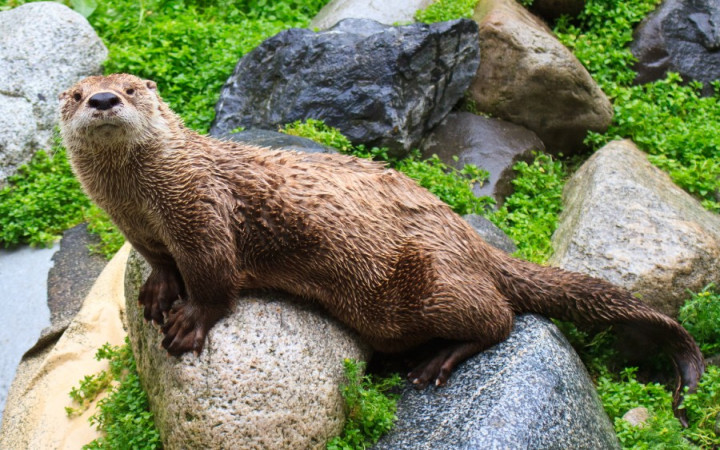Have you ever WONDERed whether animals play like we humans do? If you have a dog or a cat at home, you've probably seen them playing with balls and toys or even chasing each other around the yard.
But what about wild animals? Nature experts will tell you that wild animals play, too. In fact, if you're ever near a river or marshy area, you may see some weasel-like animals running and sliding on their tummies into the water to create a big splash. What are we talking about? River otters, of course!
The only river otter that can be found north of Mexico, the North American river otter thrives in rivers, lakes, streams, wetlands, and along the coasts of every state and territory of both the United States and Canada. The only places you won't find river otters are the dry desert areas of the southwestern U.S.
Although they're difficult to track, river otters have maintained sustaining populations despite numerous threats from predators and habitat loss. Experts believe there are over 100,000 river otters the waters of North America today.
River otters have a long history in North America. Their rich furs were favorites of French fur traders in the 18th and 19th centuries. In addition to keeping them warm, their thick fur gives them a waterproof coating that helps them survive and thrive in their favorite aquatic environments.
River otters like to live close to water, because their diet consists primarily of fish. However, they're actually semi-aquatic mammals, which means they can live on land, too. In fact, they usually live in burrows near the water and will snack on other types of food in the area, including insects, birds, shellfish, turtles, and frogs.
If asked to choose one word that describes the river otter, most experts would choose "playful." Extremely social animals, river otters can often be seen in groups playing games. They also love to run and slide on their stomachs. If you spy a river otter in the wild, it's likely you'll catch a glimpse of it sliding on its tummy down a muddy bank and into the water.
Experts note that these playful activities also serve an important purpose: they teach survival skills. In addition to strengthening social bonds, their games help them practice hunting techniques and mark their territory with their scent.
Since they spend a lot of time in the water, river otters are very good swimmers. Of course, it helps that they're able to close off their ears and noses to keep water out. When hunting for fish, river otters can dive as deep as 60 feet. They're also capable of holding their breath for as long as eight minutes!



